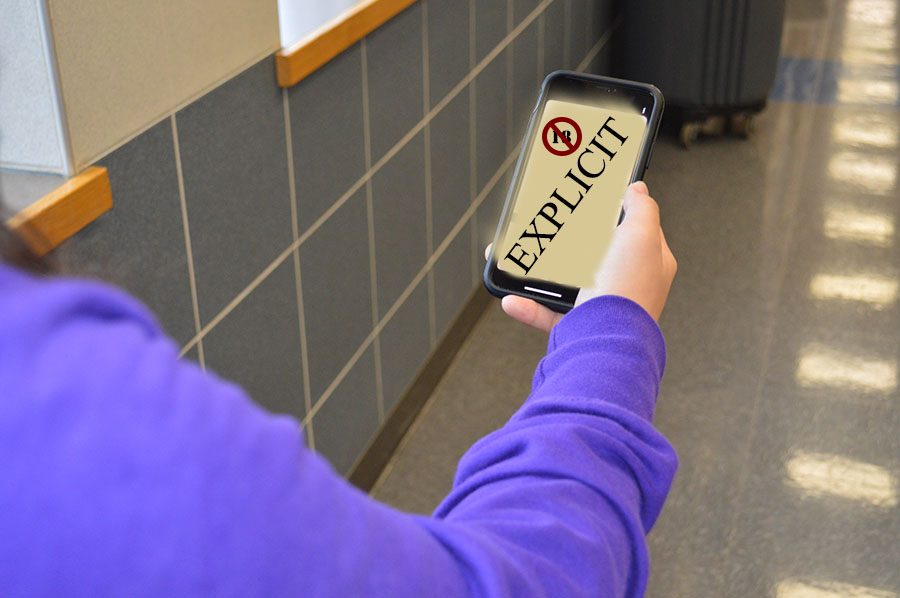Screen time to jail time
District’s attorney advises students of dangers of sexting
photo credit: Jazmine Garcia
Just say no \ “Cell phones to Jail Cells,” a presentation about the consequences of sexting and cyberbullying, was presented to all students by the district’s attorney Feb. 9.
Her heart raced with regret but it was too late. She couldn’t take it back, it was sent. Anticipating his reply she reassured herself the snapped nude would delete soon, but a week later, she was the laughing stock of the school. Three weeks later, he was arrested for cyber bullying and promoting naked pictures while she was arrested for sexting. She couldn’t remember why she would ever send such a personal photo because it obviously didn’t delete after three seconds. With the rising number of issues society is facing, the Wylie ISD Student Service department arranged for the campus to hear a presentation by the district’s attorney Feb. 9 in the Auditorium.
WISD’s Attorney, Mike Leasor, explained that social media was like playing with fire which could be used for good and bad. For example, the money raised from the Ice Bucket Challenge helped push to find a cure for ALS. 18-year-old Sam Rey’s life was saved when he butt-dialed Siri and was connected to 911 while being pinned under his 5,000 pound Dodge Dakota truck.
“People need to get it through their minds that what they post on the internet stays forever,” junior Brandon Pierce said.
While technology could be used for good, students were also shown the damage it can cause during the assembly.
Emily Stambaugh, a 17-year-old high school student from Allen, Texas, died texting and driving. 16-year-old David Molak committed suicide Jan. 4, 2016, following repeated incidents of cyberbullying on Instagram.
“It was useful information and I thought he [Leasor] presented it well,” social studies teacher Chris Bailey said.
Molak’s incident helped to form a new law in Texas that passed in the spring by the State legislature, the David Law. The legislature thought strongly enough about Molak’s case that they expanded the bullying law, which now goes more in depth into cyberbullying.
“If it isn’t true, necessary or kind, don’t do it [bully and send inappropriate pictures],” Leasor said.
A survey of East Texas schools found that 28 percent of sophomores and juniors have sent an inappropriate photo of themselves by text or email and 31 percent have asked someone to send them. The majority were girls who were pressured by boys into sending photos.
“The presentation was very informative and now I know not to send inappropriate pictures to people,” junior Daniel Taylor said.
District attorney Mike Leasor also gave students a reality check: Most high school relationships don’t last forever. He reminded them that while a relationship could fade away, things posted online don’t. Pictures could be screenshot, videoed and forwarded. Along with that, phones can get hacked, law enforcement can recover data. Databases of social media sites store everything.
“I feel like it changed a lot of the views of people,” sophomore Jordan Moore said.
Leasor warned students about who would see the inappropriate pictures. Parents, friends, Sunday school teachers, colleges, and even NCAA recruiters could see them. Colleges and employers look through social media before accepting applicants.
“What we talked about is serious, [students] could go to jail,” Leasor said. “Snapchat: It doesn’t disappear after 10 seconds. Snapchat keeps a copy of chats and snaps that law enforcement can obtain. The app’s privacy policy states ‘Keep in mind that the users you send snaps, chats, and any other content to can always save that content or copy it outside the app.’ So, the same common sense applies to the internet at large, applies to Snapchat as well: Don’t send or share content that you wouldn’t want someone else to save or share.”
Sexting is a crime in Texas that leads to time in jail and is considered to be promotion or possession of child pornography, material depicting a minor, intimate visual material, and under the education code, students can be expelled for engaging in bullying behavior. Each offense leads to time in jail and a fine.
“I feel like the assembly was very needed for certain people and people don’t take it seriously enough,” sophomore Cason Jackson said.
The presentation ended on the topic of how sexting can easily lead to bullying, sexual harassment and gender-based harassment. Victims were told to speak up, get help, and remember that it won’t last forever. Witnesses of bullying were advised to stand up for victims and report it.
Students watched two last LG phone commercials that warned teens to think of the consequences before they post.
“I consider it a success, if the presentation keeps one person out of trouble,” Leasor said.

Hi, my name is Jazmine. I play the euphonium in band and I’m the oldest out of four siblings, which takes up most of my time. Who needs sleep anyway?...


